Weizmann Institute of Science scientists have revealed another important element in the list of causes of obesity

Weizmann Institute of Science scientists have revealed another important element in the list of causes of obesity. Their findings explain how a certain protein, which works in a small area of the brain, contributes to weight gain. The research findings were recently published in the scientific journal Cell Metabolism.
Prof. Ari Elson and the research group he heads, in the department of molecular genetics at the Weizmann Institute of Science, discovered the role of the protein when they worked with mice that had been genetically modified so that their bodies did not produce a protein called tyrosine phosphatase epsilon (PTPe).
The original purpose of the experiment was to study bone thinning (osteoporosis), so the scientists removed the ovaries from the mice. Ovariectomy usually causes the mice to gain weight, and they become obese. That's why the scientists were surprised to find that the weight of the engineered mice remained stable. In an experiment carried out in collaboration with the research group of Dr. Alon Chen, from the Department of Neurobiology at the Weizmann Institute of Science, and in collaboration with Prof. Hila Knobler, director of the Metabolic Disorders and Diabetes Unit at the Kaplan Medical Center, the mice were fed a high-fat diet. Still, the transgenic mice that lacked the PTPe protein remained relatively thin. They also burned more energy and maintained more stable blood sugar levels.
To understand how and why these mice were thinner and healthier, the scientists examined the hypothalamus, an area of the brain that receives a wide variety of stimuli, and subsequently responds by sending messages - hormones and nerve signals. The hypothalamus plays an important role in controlling body weight - a complex activity that involves, among other things, the regulation of appetite and physical activity.
The scientists discovered that PTPe blocks the messages sent by a hormone called leptin - a key factor in body weight control. Later, they were also able to clarify the mechanism of its activity: it turned out that in response to the signal transmitted by leptin in the hypothalamus, the PTPe blocks certain molecules, thereby silencing the leptin signal.
Among its other functions, leptin reduces appetite and increases physical activity. Paradoxically, obese people often have an excess of leptin in their blood. The reason for this is that over time the cells lose their sensitivity to the hormone and develop resistance to its effects. In response to this, the body produces larger amounts of leptin - in an attempt to overcome resistance.
The new study shows that PTPe plays a role in the phenomenon of leptin resistance. The scientists discovered that the mice whose bodies did not produce the protein remained very sensitive to leptin, despite their advanced age, ovariectomy, or the provision of high-fat food. This fact suggests that in obese people who have developed resistance to leptin, it is possible to block the PTPe, thus restoring sensitivity to leptin and helping to lose weight. However, before using this approach to treat obesity, further studies will be required to examine the effects of PTPe in humans.
Prof. Elson: "The lack of PTPe benefited the mice, but had almost no effect on the mice. This surprising finding may open new research directions on obesity".
